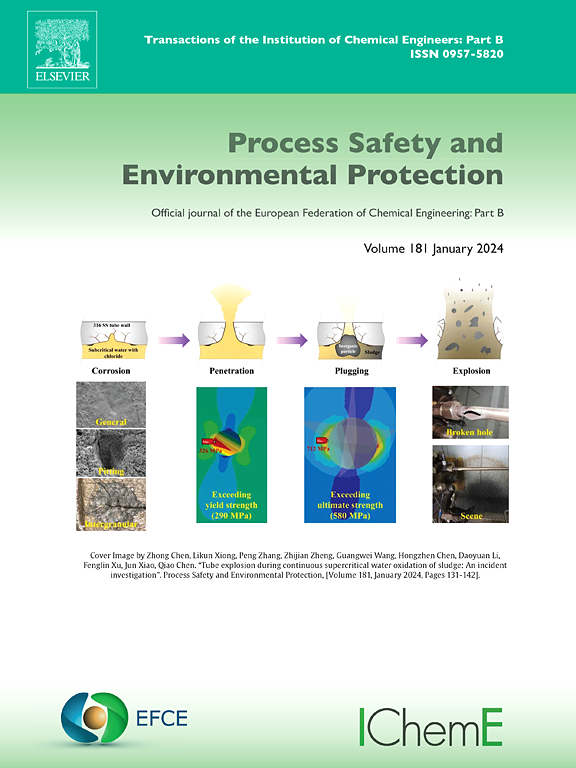Improving zinc reduction and removal from pellets of zinc-bearing dusts via vacuum microwave-assisted carbothermal reduction process
IF 6.9
2区 环境科学与生态学
Q1 ENGINEERING, CHEMICAL
引用次数: 0
Abstract
A novel approach for removal of zinc from zinc-bearing dusts has been developed via utilizing vacuum microwave-assisted carbothermal reduction. The reduction and removal mechanism of zinc-bearing minerals in the dust were thoroughly investigated through thermodynamic analysis and reduction experiments. The results demonstrate that an impressive zinc removal rate of 94.64 % and iron metallization degree of 99.68 % are achieved when the dust pellets are reduced at 1150℃ for 20 min with a C/O ratio of 1.2 and system pressure of 100 Pa and 1100 W microwave power output. In comparison to atmospheric microwave-assisted carbothermal reduction (AMR) and conventional heating carbothermal reduction (CHR) processes, vacuum microwave-assisted carbothermal reduction (VMR) process achieves higher zinc removal rate at lower temperature, shorter reaction time and less carbon usage and emission. This study presents an environmentally friendly and viable approach for the recycling of hazardous zinc-bearing dusts in the iron and steel industry.
通过真空微波辅助碳热还原工艺提高含锌粉尘颗粒中锌的还原和去除率
通过利用真空微波辅助碳热还原法,开发了一种从含锌粉尘中去除锌的新方法。通过热力学分析和还原实验,对粉尘中含锌矿物的还原和去除机理进行了深入研究。结果表明,在 1150℃ 下还原 20 分钟,C/O 比为 1.2,系统压力为 100 Pa,微波功率输出为 1100 W 时,粉尘颗粒的锌去除率达到 94.64 %,铁金属化程度达到 99.68 %。与常压微波辅助碳热还原(AMR)和传统加热碳热还原(CHR)工艺相比,真空微波辅助碳热还原(VMR)工艺能在更低的温度下实现更高的锌去除率、更短的反应时间以及更少的碳使用和排放。这项研究为钢铁工业中有害含锌粉尘的回收利用提供了一种环保可行的方法。
本文章由计算机程序翻译,如有差异,请以英文原文为准。
求助全文
约1分钟内获得全文
求助全文
来源期刊

Process Safety and Environmental Protection
环境科学-工程:化工
CiteScore
11.40
自引率
15.40%
发文量
929
审稿时长
8.0 months
期刊介绍:
The Process Safety and Environmental Protection (PSEP) journal is a leading international publication that focuses on the publication of high-quality, original research papers in the field of engineering, specifically those related to the safety of industrial processes and environmental protection. The journal encourages submissions that present new developments in safety and environmental aspects, particularly those that show how research findings can be applied in process engineering design and practice.
PSEP is particularly interested in research that brings fresh perspectives to established engineering principles, identifies unsolved problems, or suggests directions for future research. The journal also values contributions that push the boundaries of traditional engineering and welcomes multidisciplinary papers.
PSEP's articles are abstracted and indexed by a range of databases and services, which helps to ensure that the journal's research is accessible and recognized in the academic and professional communities. These databases include ANTE, Chemical Abstracts, Chemical Hazards in Industry, Current Contents, Elsevier Engineering Information database, Pascal Francis, Web of Science, Scopus, Engineering Information Database EnCompass LIT (Elsevier), and INSPEC. This wide coverage facilitates the dissemination of the journal's content to a global audience interested in process safety and environmental engineering.
 求助内容:
求助内容: 应助结果提醒方式:
应助结果提醒方式:


